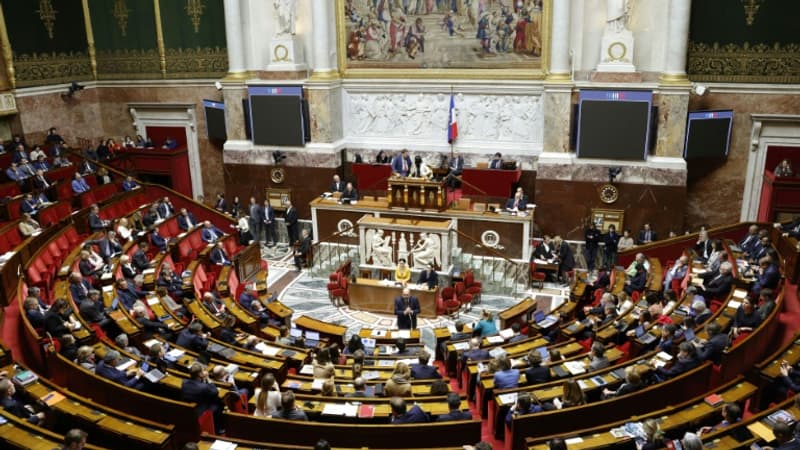The government does not want to back down. Again this Sunday, Prime Minister Élisabeth Borne affirmed that the postponement of the legal retirement age retirement age 62 to 64challenged by the unions, the left and the National Association “is no longer negotiable”.
A statement that comes on the eve of the start of the examination of the project in commission in the Assembly. What will be the parliamentary steps? BFMTV.com takes stock.
• Monday, January 30: arrival in commission
This is the beginning of practical work in the National Assembly. Starting at 9:30 a.m. this Monday, the sixty-something parliamentarians from the Social Affairs Committee will work, article by article, on the text that provides for the lowering of the legal age from 62 to 64 and the acceleration of the extension of the duration of contribution
On Saturday’s march in her Calvados constituency, Elisabeth Borne said she hoped that the parliamentary debate would allow “talking about the project with what it really contains”, denouncing the “disinformation” about the government’s intentions.
On the menu, from article 1, is the gradual abolition of most of the existing special regimes, including those of the RATP and the electricity and gas industries. Time is running out at the Palais Bourbon. MEPs have until 8:00 p.m. Wednesday to vote on some 7,000 tabled amendments, including nearly 6,000 from the left-wing Nupes alliance.
The tight deadlines are imposed by the vector chosen by the Executive, a draft amending budget from the Secu, which limits debates in Parliament to fifty days in total.
• Tuesday, January 31: second day of strike
The exchanges could be particularly tense on Tuesday, the day of the national interprofessional mobilization. After the one on January 19, in which 1 to 2 million people, according to sources, demonstrated against the reform, the unions hope to do at least the same, with a view to increasing the movement’s power.
Neglecting these “large-scale mobilizations (…) would be a mistake” both for the Government and for Parliament, warned the CFDT general secretary, Laurent Berger, on Saturday in an interview with the World.
Jean-Luc Mélenchon, for his part, suggested to the unions on Saturday that they hold a “big march (…) during a weekend” to amplify the challenge, while the opposition of the French grows according to the polls.
• February 6: the text presented in session
Although the text is not adopted in committee, it will be presented at the session on February 6. Be that as it may, it is the initial version that will be presented, without the amendments approved in committee: this is the rule for budgetary texts.
Two weeks of exchanges are scheduled in the chamber, with the Ministers of Labor Olivier Dussopt and Public Accounts Gabriel Attal in the arena, in front of deputies who promise to “maintain the trench.”
The timetable for the review of the reform is limited, assigning 20 days to the deputies for the first reading of the text, between passing it in committee and in the hemicycle. This is the deadline for a rectifying budget for Social Security (PLFSSR), the vector chosen by the government. The exchanges in the chamber must begin on Monday, February 6 and end on the 17th at midnight, so that the text can then go to the Senate.
• February 17: arrival at the Senate
If the deputies have not voted before this date, the bill will go to the first reading in the Senate on February 17. The Upper House then has fifteen days to debate it and reach a vote, after the parliamentary recess from February 20 to 26.
The upper house dominated by the right will examine the text adopted by the Assembly, or failing that, the initial text of the government, modified by the amendments that the Assembly has had time to vote on and that the executive is favourable.
• March 4: joint committee
If the text has not been voted on before that date by the senators, the bill will go to a joint joint commission, which brings together deputies and senators, who will try to reach an agreement. If there is an agreement, it must be validated by both chambers. Otherwise, the text will make one last run and the Assembly will have the last word.
• March 26: Deadline
Parliament must decide in total within 50 days, that is, before March 26 at midnight, otherwise the provisions of the reform can be implemented by ordinance, the Constitution provides. The government could then make use of section 47.1. It would be the first time in the history of the Fifth Republic.
Source: BFM TV


